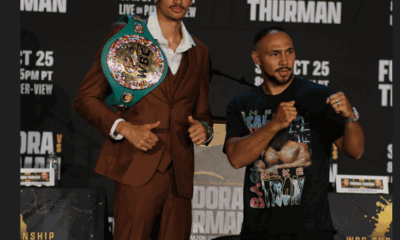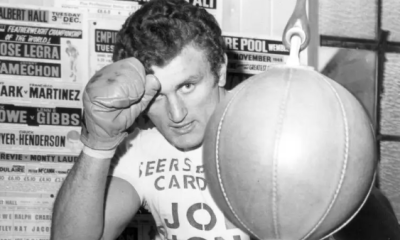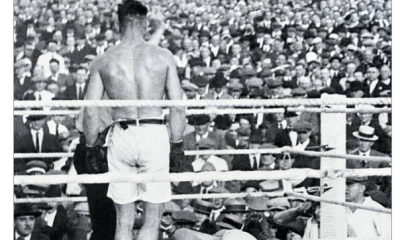Canada and USA
A Conversation with International Boxing Federation President Daryl Peoples
A LOOK INSIDE THE INTERNATIONAL BOXING FEDERATION — In 1995, six years after earning a degree in political science from New Jersey’s Upsala College, Daryl Peoples joined the International Boxing Federation in the role of an administrative assistant. He stayed the course through turbulent times, advancing through the ranks. In May of 2010, after serving as the chairman of the ratings committee, Peoples was named the organization’s president, replacing Marian Muhammad, who was ousted by the Board of Directors.
The International Boxing Federation (hereafter the IBF) was founded in 1983 by Bob Lee who was roused to start a new sanctioning body after a failed campaign to win the presidency of the World Boxing Association (WBA). Lee, a former Hudson County (New Jersey) police detective, was one of two deputy commissioners on the New Jersey Athletic Commission and the vice-president of the WBA, the sport’s oldest governing body, when he left the WBA to form the rival organization.
While there were groans that the last thing the sport needed was a third international governing body (a fourth, the WBO, was founded five years later), Lee’s splinter group was welcomed in many quarters. The two established organizations were based in Latin America, specifically Panama and Mexico, and were partial to fighters from those regions. “American fighters are the best in the world, but often several good ones are left out in the monthly ratings,” noted New York Times boxing writer Michael Katz in a piece that appeared in 1981.
The fledgling IBF got a quick shot in the arm in December of 1983 when heavyweight champion Larry Holmes – who was then upset with his promoter Don King – relinquished his WBC belt and announced that his future title defenses would come wrapped with an IBF imprimatur. Following this action, Bob Lee swelled the roster of IBF champions with established champions from other organizations, a gesture that enhanced the credibility of his agency. Within a few years, one could fairly say that the upstart IBF had achieved parity with the WBA and WBC.
Lee was forced to step down in 2000 following his indictment on federal racketeering and bribery charges. It was alleged that he took money from promoters to rig the ratings so that certain fighters could qualify for more lucrative matches. In the summer of that year, after a four-month trial, he was found guilty on six of 38 counts and sentenced to 22 months in prison.
Bob Lee’s successors – Hiawatha Knight, Marian Muhammad, and now Daryl Peoples – inherited an organization with skeletons in its closet. This reporter recently interviewed Peoples and hopes to interview the heads of the three other sanctioning bodies in the near future.
Daryl Peoples acknowledges that some of the criticisms directed at the sanctioning bodies have merit. “But here’s the thing,” he said, “a lot of (the critics) aren’t familiar with our rules.” He says this matter-of-factly, without a trace of rancor toward the fault-finders.
Jose Sulaiman, the president of the WBC from 1975 until his death in 2014, stayed in office so long that it was as if he was granted a lifetime appointment. That made him, depending on one’s perspective, the boxing equivalent of a dictator in a third world country or the Chief Justice of the U.S. Supreme Court. Peoples notes that his term is up for renewal every year and won’t roll over if the Board of Directors is dissatisfied with his stewardship. The Board consists of 11 members, each elected for a three-year term.
The IBF currently has no interim champions, but there is a precedent for it. “We only consider an interim champ if the champion is duly injured and unable to fight his mandatory,” says Peoples. When the champion comes back — and he can’t hold his medical exemption for more than a year – he must fight his mandatory. There is, however, an alternative.
“In our organization,” says Peoples, “unifications take precedence over mandatories.” If an IBF champion has an opportunity to fight the champion of another organization, the mandatory goes on the back-burner.
A glance at the rankings by the various organizations turns up some curious lists. No organization is free of this taint. In the eyes of some, the IBF magnifies the muddle by leaving the top two positions vacant in some of the weight classes. But there is a method to their madness.
“We like to reserve those spots,” says Peoples, “for boxers fighting a title eliminator.”
Ideally, an eliminator brings together the contenders most worthy of being ranked #1 and #2, but here again circumstances sometimes dictate an exception. (That opens the door to conniving, note the cynics, but how could it be otherwise in a sport as freewheeling as professional boxing? When was the last time that a tournament played out exactly as it was designed, with none of the contestants dropping out along the way? That’s a rhetorical question.)
Sanctioning bodies are supported by sanctioning fees. The IBF duns a promoter 3 percent of the combined purses of the two fighters, 2 percent if another sanctioning body is also involved. (It’s common knowledge that fees are sometimes negotiable.) A secondary source of income, although far less weighty, accrues from the sale of IBF merchandise. All of this money, notes Peoples, goes into the organization’s SARB/Education Fund which provides financial assistance to retired boxers in need and provides scholarships for their descendants. At their annual conventions, which are open to the public with the payment of a registration fee, the IBF derives additional money for SARB (the acronym stands for Special Assistance to Retired Boxers) via raffles.
The conventions of the sanctioning bodies have been portrayed as nesting places for shady deals. Lost in this caricature are the educational benefits. Seminars for referees, judges, and other officials are an important component of these conventions. Inspectors – those are the folks seen hovering around the corners of boxers during the interim between rounds – are excluded as they are accountable to state boxing commissions. A separate association holds seminars for ringside physicians.
The big question – the question that fight fans have now been asking for decades – is whether there will ever come a day when the regulatory structure of boxing is less disheveled, a day when all of the sanctioning bodies are on the same page.
Darryl Peoples allows that he is hopeful. As for his relationships with his counterparts in the other organizations, Peoples says “I get along well with all of them.”
—
The 2017 convention of the International Boxing Federation will be held May 21-25 at the Hilton Bayfront in St. Petersburg, FL. For more information about the IBF, visit their web site at www.ibf-usba-boxing.com
Check out more boxing news on video at The Boxing Channel.
-

 Book Review4 weeks ago
Book Review4 weeks agoMark Kriegel’s New Book About Mike Tyson is a Must-Read
-

 Featured Articles2 weeks ago
Featured Articles2 weeks agoThe Hauser Report: Debunking Two Myths and Other Notes
-

 Featured Articles3 weeks ago
Featured Articles3 weeks agoMoses Itauma Continues his Rapid Rise; Steamrolls Dillian Whyte in Riyadh
-

 Featured Articles2 weeks ago
Featured Articles2 weeks agoNikita Tszyu and Australia’s Short-Lived Boxing Renaissance
-

 Featured Articles4 weeks ago
Featured Articles4 weeks agoKotari and Urakawa – Two Fatalities on the Same Card in Japan: Boxing’s Darkest Day
-

 Featured Articles3 weeks ago
Featured Articles3 weeks agoIs Moses Itauma the Next Mike Tyson?
-

 Featured Articles4 weeks ago
Featured Articles4 weeks agoRamirez and Cuello Score KOs in Libya; Fonseca Upsets Oumiha
-

 Featured Articles2 weeks ago
Featured Articles2 weeks agoBoxing Odds and Ends: Paul vs ‘Tank,’ Big Trouble for Marselles Brown and More





















